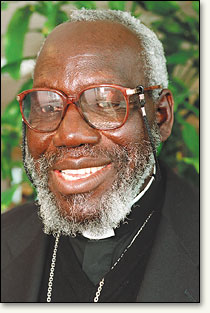|
|
The Good News from Africa
Bishop asks Americans: ‘come and see’ Sudan’s people
By Michelle Martin
Staff Writer
Sitting at an office conference table, eating bean salad from a deli container and sipping apple juice from a plastic bottle, Bishop Paride Taban seems right at home.
His black clerical clothing is a bit faded, the shirt a few shades lighter than his complexion. A pin on his sweater quotes Pope Paul VI: “If you want peace, work for justice.”
Peace and justice—and hope—have brought him to the United States from the southern Sudan, with an itinerary that included meetings with members of the National Security Council, representatives of the U.S. Conference of Catholic Bishops in Washington and a meeting with Father Theodore Hesburgh and a talk at the University of Notre Dame.
He came here to see Bill Purcell, director of the archdiocesan Office for Peace and Justice, who visited him in Sudan last spring. What he wants from American Catholics, he said, is for them to be aware of their Sudanese brothers and sisters—not only of their miseries and needs, but also the joy and grace of people who live where humanity began, in lands of Old Testament.
“My name, Taban, means I never get tired,” the bishop laughed, “and that I sometimes cause trouble for other people.”
Bishop Taban could be forgiven for sometimes feeling fatigued. At 66, he lives as a nomadic shepherd among his flock, moving to avoid the bombs dropped by the Sundanese government on areas held by the Sudan Peoples Liberation Movement—which includes most of his diocese. The government controls only the cities, including the see city of Torit, where the bishop can no longer stay.
“When I go to visit people, I have my tent and my sleeping bag,” he said. “I can use my shoes as a pillow, no problem. When we were under siege (in Torit, in 1988-89) we each had two pairs of pants and two shirts. You have not much things to care for, so you can move easily.”
A priest since 1964 and bishop since 1980, Bishop Taban has spent his life ministering in a war-ravaged country. Fighting between the Islamic, mostly Arab government in the north and the black African Christian and animist population in the south began even before official independence from Britain in 1956 and continued until 1972. A relative peace reigned until shortly after oil was discovered in the south, and the introduction of Islamic Sharia law in 1983.
Since then, more than 2 million civilians have been killed and 4 million displaced, 500,000 of them from the Torit Diocese. Both the Khartoum government and the SPLM use starvation as a weapon as they try to take new territory; the government will bomb anything in the southern countryside that looks like civilization, while the rebel group has pressed children into service as soldiers. Most of the agricultural tribespeople from the Torit Diocese have left the country, becoming refugees in Uganda and Kenya. The nomads—and the church—stay.
“Our best buildings are the Sierra tents,” Bishop Taban said. “When we are uprooted, we take them with us. They protect us from snakes, mosquitoes, rain, everything except bombs. Our best churches and schools are the big trees.”
The church has grown 500-fold during the last 20 years of war, the bishop said. Even so, it was the SPLM, not the government, who attacked a food convoy Bishop Taban led to Torit in 1988 and imprisoned him and three other priests several months later. Their crime was feeding the people, making it harder for the SPLM to conquer the city. He was released more than three months later, and has worked in the SPLM-controlled territory ever since.
Meanwhile, some 10,000 unaccompanied children have moved into and through the diocese, many from hundreds of miles away. Maybe their parents are dead. Maybe they are fighting. Maybe they are lost. The children don’t know. So the church tries to support and teach them.
“The children are at the mercy of God,” Taban said.
Church leaders of several Christian faiths have joined together to push for a peace that would include self-determination for southern Sudan, with a free and fair referendum and the possibility of becoming an independent state. The U.S. government supports the peace process, but in Washington, Bishop Taban urged government leaders to push harder.
“The United States is really the only country with the influence to do it,” he said.
When the U.S. bishops asked what they could do, he did not deny his diocese needs money and food aid. But more important than sending donations is to “come and see,” he said. Several bishops took him up on an earlier invitation, and have become advocates for the people in southern Sudan.
“They have become the voice for the voiceless,” he said. “They came, and they slept in the huts where we sleep, they shared in our hunger and they saw the large bombs falling on the ground. … War cannot be won. War can only kill people.”
“We want the church in America to be in link with us. We have some relief from the United Nations, from Catholic Relief Services. But we don’t have many pastoral supports. Our priests are traumatized. They don’t have churches, they don’t have vehicles, they don’t have houses to stay in.”
Perhaps, he said, some American parishes would twin with Torit parishes, providing some financial help, maybe hosting a priest for a short trip to the United States or even sending some people to visit Torit.
For information on “twinning” with a Sudanese parish, call Purcell’s office at (312) 751-5383.
Front Page | Digest | Cardinal | Interview
Classifieds | About Us | Write Us | Subscribe | Advertise
Archive | Catholic Sites | New World Publications | Católico | Directory | Site Map
|






